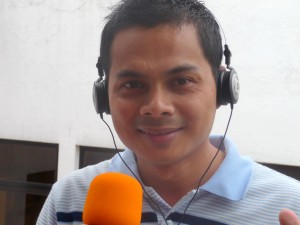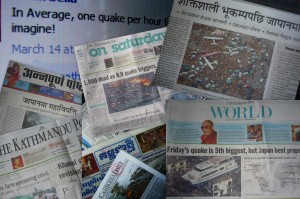Search Results for Tag: asian coverage
Nepali media and Japanese disaster
By Shyam Rai, Kathmandu, Nepal
 Radio Nepal news editor Shyam Rai writes that the Nepali media covered the disaster in Japan from the very beginning. The first reason for this is that the incident itself was huge and newsworthy.
Radio Nepal news editor Shyam Rai writes that the Nepali media covered the disaster in Japan from the very beginning. The first reason for this is that the incident itself was huge and newsworthy.
The second reason is that sometimes even small incidents taking place in Japan (which might not get space in other countries’ media) are reported by Nepali media because Japan is one of Nepal’s major donor countries and contributes greatly to its development.
At first the media focused primarily on casualties and losses caused by the earthquake and tsunami. Some broadsheet newspapers and radio stations carried the incident on the front page and as a top story respectively whereas some included it in their international segments.
All of them focused on casualties and the destruction followed by damages caused to the nuclear reactors in Fukushima.
![]() read more
read more
Japanese tragedies stir nuclear debate in Indonesia
By Permadi Kencono Wulan
 From Indonesia former DW-AKADEMIE trainee Permadi Kencono Wulan writes that almost all of the country’s media have been covering the events in Japan from the moments they began. Focus has been on memories of the tsunami that happened in Indonesia, the strength and fortitude of the Japanese people, the impact of the damaged nuclear reactors and on Indonesian eyewitnesses who had been living in Japan, alongside interviews with celebrities who have lived there.
From Indonesia former DW-AKADEMIE trainee Permadi Kencono Wulan writes that almost all of the country’s media have been covering the events in Japan from the moments they began. Focus has been on memories of the tsunami that happened in Indonesia, the strength and fortitude of the Japanese people, the impact of the damaged nuclear reactors and on Indonesian eyewitnesses who had been living in Japan, alongside interviews with celebrities who have lived there.
News also stirred about Japanese adult film star Miyabi who had gone missing after the tsunami. Much news space in Indonesia was devoted to coverage of the evacuation and the impact of the nuclear reactors at Fukushima.
The impact of an exploding nuclear reactor
Permadi, who is head of new media at RRI Indonesia, highlighted early reports by Indonesia’s Metro TV on the impact of a nuclear reactor that exploded and the possibility of radiation. It communicated how this concerns the world community at large and Indonesia in particular because of the effects of radiation that might spread due to wind, sea water, birds and migrating fish.
![]() read more
read more
Khmer coverage of Japan’s tsunami
By Raksmey Meas
 Raksmey Meas, assistant lecturer at the Department of Media and Communication at the Royal University of Phnom Penh, reports that Japan’s catastrophe involving the recent earthquake and subsequent tsunami has yet again taken center stage in the world media’s attention.
Raksmey Meas, assistant lecturer at the Department of Media and Communication at the Royal University of Phnom Penh, reports that Japan’s catastrophe involving the recent earthquake and subsequent tsunami has yet again taken center stage in the world media’s attention.
Particularly in Cambodia, news related to Japan and its disaster racked up on front pages for more than a week following the initial shock on March 11th.
Regarding the focus of Cambodian media on this tragedy, news angles seem to be anything on the updates of the situation – death toll, possible nuclear explosion and rescue efforts, etc.
![]() read more
read more
Asian media coverage of Japan in crisis
 Recent events in Japan shocked the world. The magnitude 9.0 earthquake that hit on March 11th and the tsunami and nuclear disaster it triggered have been top developing stories for media everywhere. But the focus and style of reporting differ from one country or region to the next.
Recent events in Japan shocked the world. The magnitude 9.0 earthquake that hit on March 11th and the tsunami and nuclear disaster it triggered have been top developing stories for media everywhere. But the focus and style of reporting differ from one country or region to the next.![]() read more
read more



